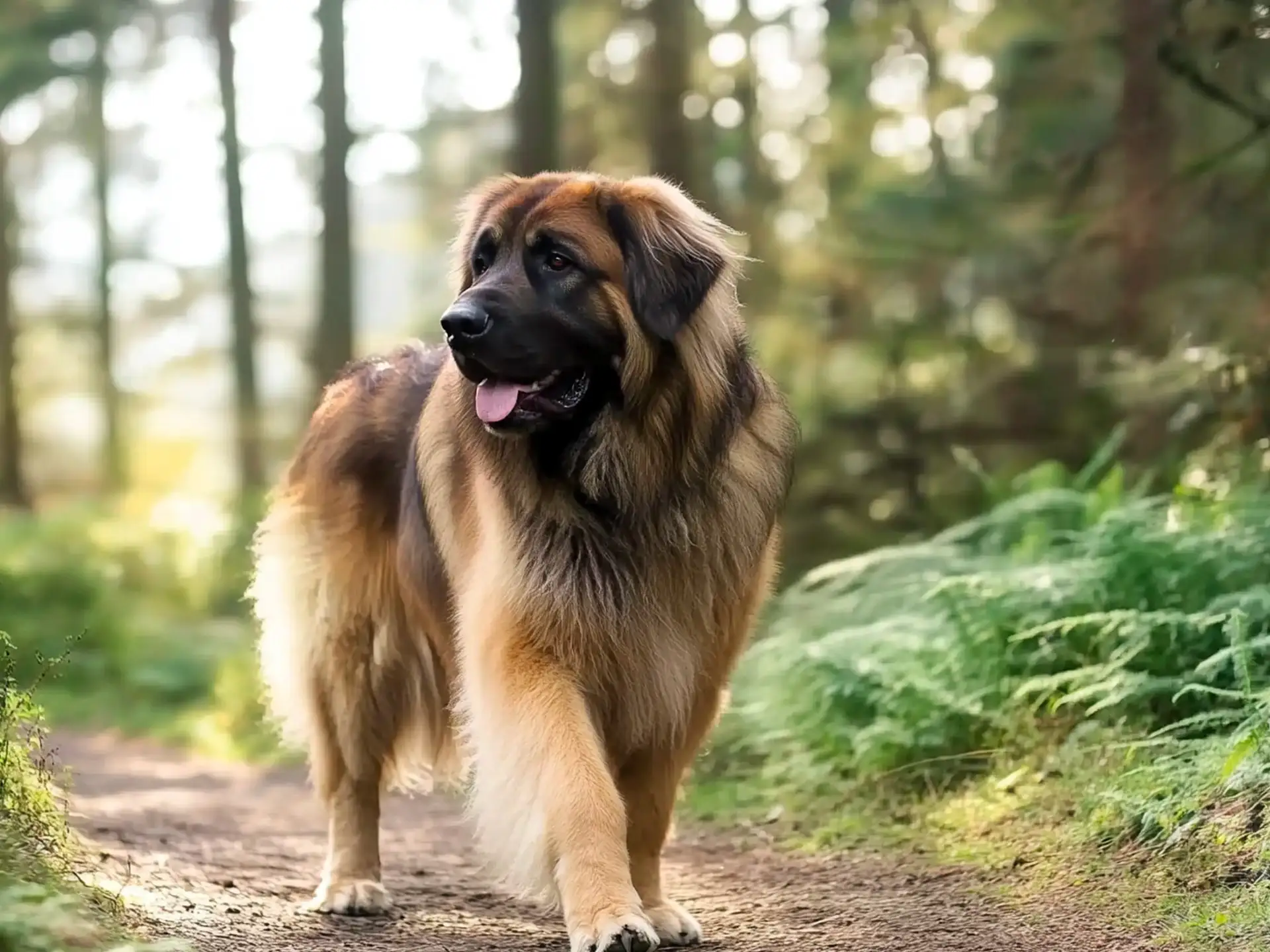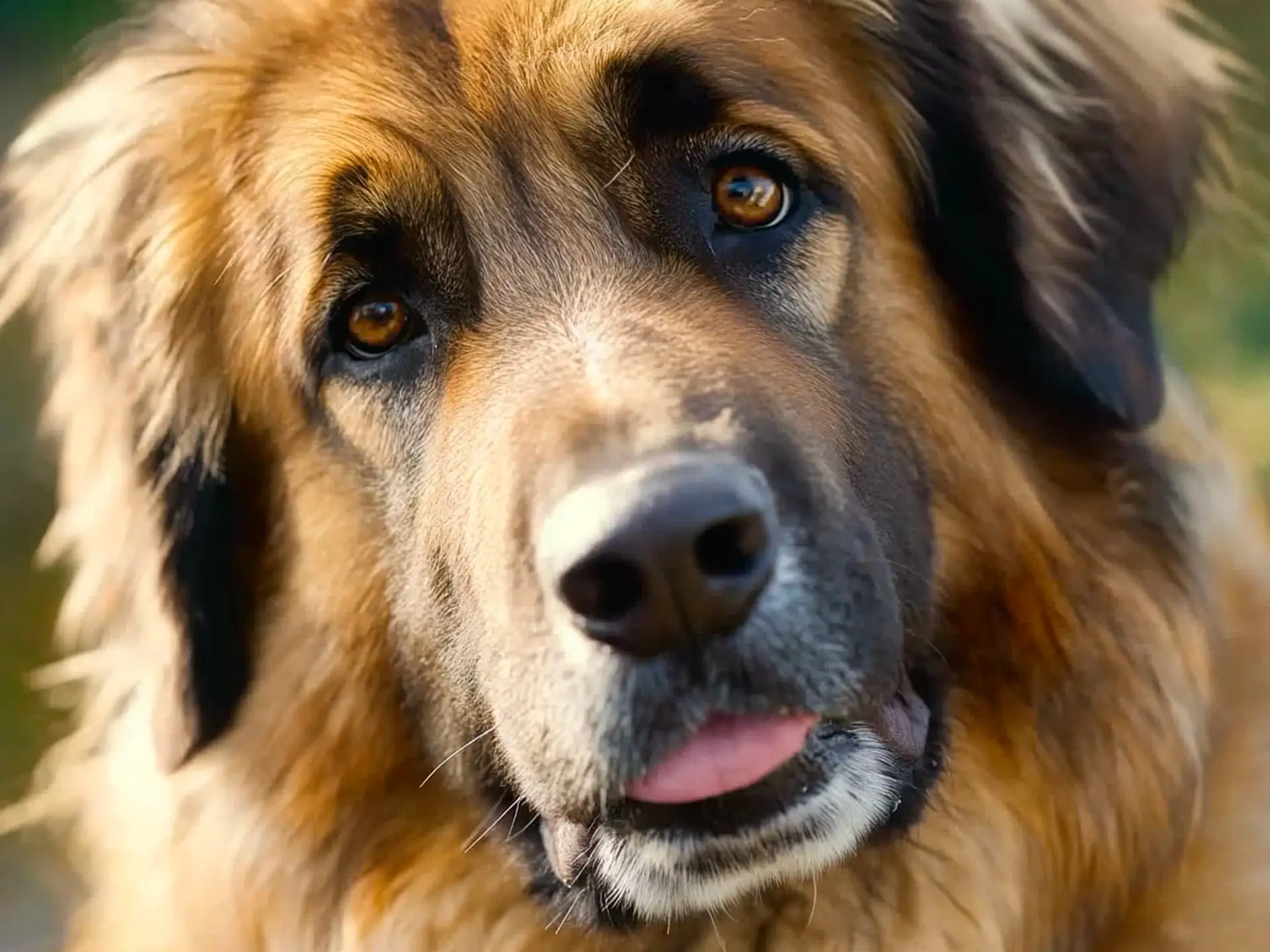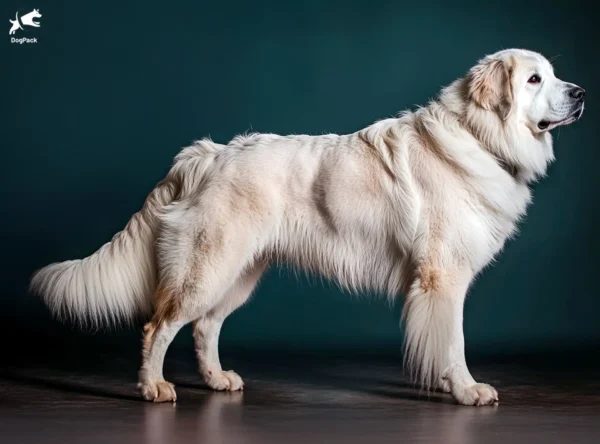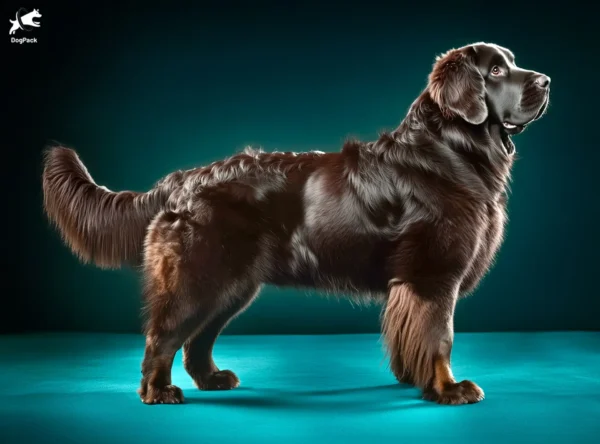Leonberger Dog Breed Info & Overview
Leonbergers are gentle giants with fluffy manes and friendly dispositions that make hearts melt. Their commanding presence often turns heads, yet they’re sweet and eager to please. Originally bred for companionship, they thrive in a loving family home where they can sprawl across the couch and happily shadow their favorite humans—just be ready for extra-large snuggles.
Characteristics
Pictures
Breed History
The Leonberger traces its roots back to 19th-century Germany, specifically the town of Leonberg—hence the name. Legend says the breed’s founder aimed to create a dog that resembled the lion on the town’s crest, mixing Saint Bernards, Newfoundlands, and Great Pyrenees to achieve that striking appearance. Originally favored by European royalty, they quickly gained popularity for their regal stance and gentle manner.
Over time, Leonbergers became a symbol of status among the aristocracy. Nobles were enchanted by their massive stature and serene dispositions, which made them both imposing guardians and affectionate pets. The breed nearly went extinct during the World Wars, but dedicated fanciers carefully preserved its bloodlines. Today, the Leonberger stands tall as a thriving working breed with a proud heritage.
Diligent breeders revived the Leonberger post-war, emphasizing stable temperaments along with that luxurious, lionlike coat. These dogs took on varied roles—farm helpers, water rescue partners, and beloved family companions. Thanks to their adaptability, the breed has spread beyond Germany, earning admirers across the globe. Whether patrolling farmland or sprawling on a suburban lawn, they continue to captivate hearts with their formidable yet gentle presence.
Temperament, Personality
Easygoing and gentle, Leonbergers are the definition of a loyal friend. They thrive on human interaction, preferring to be part of day-to-day family activities rather than alone in the backyard. Their signature calmness is often paired with a playful streak—don’t be surprised if this mountain of fur decides to nudge you for a game of tug-of-war mid-afternoon.
Many owners lovingly refer to Leonbergers as “gentle giants,” perfect companions for children thanks to their patience and sweet nature. While they’re usually calm, they can still have surprising bursts of puppy-like energy. Encouraging socialization from a young age helps them greet strangers politely and get along with other pets. They seldom show aggression, but they do command respect through their size alone.
Their sincerity shines through in everything they do, whether it’s flopping down at your feet or vigilantly standing guard. Leonbergers love forming deep bonds, so don’t be shocked if they follow you from room to room like a giant shadow. They’re known for their empathetic side, often sensing when their humans need a little extra snuggle. In short, they relish their role as beloved family members.
Physical Characteristics
Leonbergers are best recognized by their majestic double coat, which features a water-resistant underlayer and a tawny outer coat that can range from golden-yellow to reddish-brown. A black mask frames their kindly eyes, giving them a wise, expressive face. Their massive build is balanced with a strong, muscular frame—a true testament to their working heritage.
A thick ruff of fur graces their neck and chest, especially pronounced on males, enhancing their lion-like appearance. Large, webbed paws hint at their swimming prowess, while their bushy tail often waves gently like a feather duster behind them. When it comes to regal doggy aesthetics, few breeds can match the Leonberger’s blend of grace and sheer presence.
Despite their grand size, Leonbergers are surprisingly agile. They have a fluid gait and carry themselves with dignity, rarely appearing clumsy. Thanks to careful breeding, their massive stature aligns with balanced proportions—broad head, deep chest, and strong shoulders. From their alert ears to their strong rear legs, every part of the Leonberger radiates power and poise, an impressive sight on any outing.
Health Issues
Like many large breeds, Leonbergers can be prone to hip and elbow dysplasia. Keeping them at a healthy weight from puppyhood is crucial, as extra pounds can exacerbate joint issues. Routine X-rays and check-ups with a trusted veterinarian allow for early detection and intervention, helping your dog stay comfortable and mobile in the long run.
Leonbergers may also experience eye concerns like entropion or ectropion, conditions where the eyelids roll inward or outward. Regular eye exams ensure your pup sees clearly and can prevent long-term damage. Some individuals are susceptible to bloat (gastric torsion), a life-threatening condition common in large-chested breeds, so learning the signs and taking feeding precautions are essential.
Heart conditions, such as dilated cardiomyopathy, can appear in Leonbergers. Periodic screenings—especially once they hit middle age—enable you to catch cardiac problems early. To promote well-being, feed a specially formulated, high-quality diet for large breeds and provide moderate, controlled exercise. Proactive care, including annual veterinary exams and appropriate supplements, can significantly improve both quality of life and lifespan for this remarkable breed.
Grooming Needs
Prepare for daily brushing sessions with your Leonberger, as that luxurious double coat can quickly tangle if left unattended. The upside? These grooming moments double as quality bonding time. Equip yourself with a sturdy slicker brush or a rake comb designed for thick coats. A quick daily brush keeps matting at bay and reduces the tumbleweeds of fur rolling across your floors.
Expect heavier shedding during seasonal coat “blow-outs,” which typically happen twice a year. At these times, investing in a high-velocity pet dryer can make a world of difference by loosening dead undercoat. Occasional baths, roughly every 6–8 weeks, help maintain coat hygiene, but overbathing can strip natural oils. Pay special attention to their ears, trimming away excess fur to allow air circulation and reduce infections.
Trimming nails every few weeks and checking paw pads for debris ensures your Leonberger stays comfy, especially if they’re active outdoors. Dental care is key, too—daily brushing or dental treats preserve those healthy chompers. Don’t forget about the big, bushy tail! Keep tangles away by combing it gently. Though grooming can be time-intensive, it’s worth it to keep that glorious coat looking tip-top.
Exercise Requirements
You might imagine a couch potato, but Leonbergers actually appreciate a good romp in the yard. While they’re not hyperactive, they do need consistent, moderate exercise—about one or two hours daily. Activities like swimming, brisk walks, or puzzle toys help them burn off energy without overstraining their joints. They usually enjoy any chance to splash around, thanks to their partially webbed feet!
However, don’t let their goofball nature fool you; too much jumping or intense exercise can stress developing bones in puppies. For adults, structured play sessions, short hikes, and backyard fetch are perfect ways to keep them nimble. Social outings to dog parks are fun for well-socialized Leonbergers, but always watch their interactions closely due to their considerable size advantage over smaller breeds.
If you’re feeling adventurous, consider drafting or cart-pulling sports. Leonbergers love a “job” to channel their working-dog heritage. Challenge their minds with obedience training exercises or agility courses modified for large breeds. Balancing mental stimulation with daily physical routines yields a happy, relaxed companion who’s delighted to curl up (or sprawl out) by your feet after a fulfilling day’s work.
Training Tips
Start your Leonberger’s training early, ideally during the puppy phase, to gently mold good manners before they grow to full size. These dogs respond best to positive reinforcement techniques like praise and treats. Consistency matters—set clear boundaries and keep sessions short but frequent. They’re typically eager learners but can be sensitive if scolded too harshly.
Socializing from a young age helps curb potential shyness or protective streaks. Introduce them to various people, places, and other animals, making each encounter positive. This ensures your Leonberger grows into a well-adjusted adult confident in new environments. Group obedience classes offer an opportunity to polish commands while your gentle giant learns proper doggy etiquette around peers.
Because Leonbergers are bright, they can also develop their own ideas. Consistent repetition, plenty of patience, and high-value rewards keep them engaged. Use firm yet loving guidance—remember, a dog this size benefits from understanding cues thoroughly. With dedication, you’ll shape a well-mannered companion who melts hearts with polite greetings and calm composure, whether greeting guests at home or strutting through the local pet-friendly café.
Nutrition, Diet
Leonbergers thrive on a balanced, large-breed-specific formula that supports their joint health and overall growth. Aim for dog food rich in glucosamine and chondroitin to promote strong bones. Proteins from salmon or lamb can be beneficial, offering both essential amino acids and healthy fats to keep that big body fueled. Look for diets with moderate calcium-to-phosphorus ratios to avoid overly rapid growth.
Puppies require carefully controlled feeding schedules to ensure they grow at a steady, safe rate. During the adult phase, a Leonberger typically eats three to four cups of high-quality kibble daily, split into two meals to help prevent bloat. Measuring portions is crucial—free feeding can lead to weight gain that strains joints. Add occasional fresh ingredients, like lean meat and vegetables, for variety.
As they age, Leonbergers may need adjusted feeding quantities or specialized senior formulas. Collaborate with your vet to monitor body condition, watch for signs of food intolerances, and tweak protein or fat levels as needed. Supplementation with fish oil can keep their coat glossy and joints supple, while offering treats wisely ensures they maintain a healthy weight. A well-rounded diet keeps your giant buddy in tip-top shape.
Adoption, Breeders
When searching for a Leonberger, prioritize reputable breeders who focus on health clearances and temperament testing. A thorough genetic background check reduces the risk of inherited health issues. Leonberger Club of America provides a list of recognized breeders and adoption resources. Responsible breeders will happily introduce you to the puppy’s parents and discuss potential concerns specific to this large, loving breed.
If you’re open to adoption, local rescue organizations and Petfinder sometimes feature Leonbergers needing new homes. While less common than smaller breeds, adult Leonbergers seeking forever families do pop up. Ask about the dog’s history, including past training and health. Thoroughly evaluate any potential match to ensure their personality suits your lifestyle and environment.
Patience is essential, as waiting lists for Leonberger puppies can be long. Steer clear of puppy mills offering cheap pups without health guarantees. Red flags include no vet records, no spay/neuter contract, or vague lineage details. Bringing this majestic companion into your life is a significant investment of both money and love. Make sure to partner with sources that put the dog’s welfare first.
Family Pet?
Leonbergers shine in busy households where they can be part of the daily chaos. From the chaotic morning routine to evening relaxation, these dogs delight in every moment. They’re especially fond of kids, often tolerating the inevitable pokes and prods with patience. Of course, supervised play is a must, given the breed’s giant size and the potential for accidental bumps.
Early lessons on gentle interactions benefit both the dog and any tiny humans in the house. Leonbergers typically get along with other pets if introduced properly, thanks to their easygoing temperament. They’re rarely troublemakers, but always watch them around smaller animals—one enthusiastic paw can topple a cat’s dignity in seconds. Socialization helps them remain well-adjusted in a household brimming with activity.
Although affectionate, they do shed heavily and require lots of grooming and floor space. If your clan can handle the regular hair tumbleweeds, this breed’s big heart more than compensates. They relish in forming deep connections with their family and can be comically clingy, always looking for belly rubs or a place to rest that giant head. In short, they’re a wonderful match for devoted families.
Right For You?
Before welcoming a Leonberger, ask yourself if you’re ready for daily grooming marathons, hefty food bills, and occasional drool splatters on the wall. Spacious homes with secure yards are ideal; apartments can be challenging for such a large dog. While they adapt well to moderate exercise schedules, they’re not a great fit for minimal-activity lifestyles or owners uninterested in managing a giant breed’s needs.
Families or experienced dog owners often find the Leonberger’s temperament a perfect balance of calm and fun. If you’re prepared to devote time to training, brushing, and providing mental stimulation, they’ll reward you with devotion. They crave companionship, so consider whether your schedule allows ample bonding and playtime. Their gentle but protective nature can offer a sense of security in the home.
Those who relish big dog cuddles, enjoy consistent routine, and have enough living space for a canine the size of a small bear are likely to find a Leonberger fulfilling. Ultimately, they’re a brilliant option for folks wanting a steadfast friend that’s happy to lounge around but also bursts into frolicking exuberance. If you can handle the maintenance, you’ll be rewarded with unconditional, oversized doggy love.
Conclusion
With proper care, the Leonberger can be the devoted companion you never knew you needed. Yes, they take up half your sofa and shed enough fur to knit a second dog, but their calm spirit and unwavering loyalty are treasures beyond measure. If you’re seeking a majestic, family-oriented friend whose lionlike presence warms the heart, a Leonberger might just be your ultimate gentle giant.
FAQs
-
What inspired the Leonberger’s name?
The Leonberger is named after the city of Leonberg in Germany, where the breed was developed in the 19th century. Its majestic appearance was intended to resemble the lion depicted on the town’s coat of arms.
-
How well do Leonbergers handle water activities?
Leonbergers are excellent swimmers and often enjoy water activities. Their webbed feet and water-resistant double coat make them natural in the water, making them ideal for activities like water rescue training and swimming.
-
Do Leonbergers have a natural instinct for family protection?
Yes, Leonbergers are naturally protective without being aggressive. Their calm demeanor and strong bond with their family make them excellent watchdogs, alerting to potential threats while remaining gentle with loved ones.
-
How do Leonbergers communicate their emotions?
Leonbergers are known for their expressive faces and subtle vocalizations. They may use low rumbles, soft barks, or a playful “woo-woo” to communicate affection or alert their owners to something interesting.
-
Are Leonbergers prone to drooling?
Yes, Leonbergers tend to drool, especially after eating or drinking. Keeping a cloth handy and maintaining proper oral hygiene can help manage this characteristic of the breed.
Breed Ratings
The Leonberger is bright and trainable but sometimes stubborn.
While they love to romp, Leonbergers also cherish long naps.
Moderate activity needs—short bursts of play and daily walks keep them content.
Expect constant shedding plus seasonal blow-outs. Brush often!
Generally low, but early socialization helps smooth interactions with small pets.
Their thick coat needs frequent brushing and maintenance.
Consistent positive reinforcement reaps great results with this breed.
Prefers human company; can become lonely if left too long.
Mostly quiet, but they’ll voice concerns if they sense a threat.
Mild to moderate drool can appear around mealtime or after drinks.
Generally sociable, though proper introductions are always recommended.
Susceptible to joint and heart issues but overall robust with proper care.















